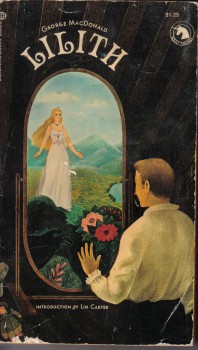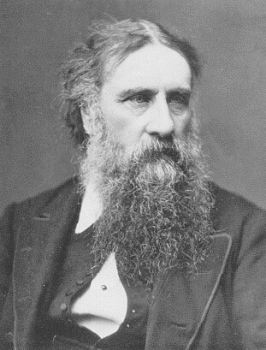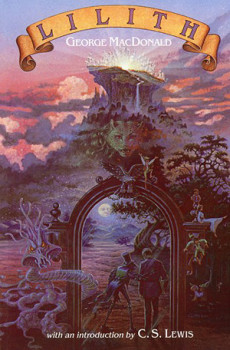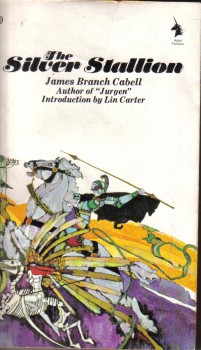The Ballantine Adult Fantasy Series: Lilith by George MacDonald
 Lilith
Lilith
George MacDonald
Ballantine Books (274 pages, September 1969, $1.25)
Cover art by Gervasio Gallardo
Lilith was the fifth volume in the Ballantine Adult Fantasy series. The cover is one of the darkest in the series to date. The back cover shows the inside of an attic. I normally post an image of the back cover, but I won’t here. It’s almost a monochrome and it’s dark.
In many ways, Lilith was different from the few that came before it. For starters, it was written from a decidedly Christian worldview and there were passages in it that seemed allegorical to me. Lilith was certainly the most metaphysical of the books I’ve read in the series so far. There were several conversations about identity and how a person can know who they are.
A favorite practice of literature majors everywhere is to try to determine symbolism in works and to dissect them for hidden meanings. The structure of Lilith certainly lends itself to this type of thing and, not being an English major, I’m not going to attempt much of that here.
George MacDonald (1824-1905) was a Scottish pastor who retired early to devote himself to literature, although he continued to preach in a lay capacity at times. Much of his output consisted of novels that were set in what for MacDonald was contemporary times, but also contained poetry, collections of sermons, and fairy stories. There are two other volumes by MacDonald in the BAF series: the novel Phantastes and Evenor, a collection of three novellas.

By all accounts, MacDonald’s life was a successful and happy one. He and his wife had eleven children. His books sold well during his lifetime and he was friends with a number of literary figures of his day.
Lilith was his final fantasy, published in 1895. It is very much from the Victorian era.
The story is narrated by a Mr. Vane (the name is no coincidence), whose parents died a number of years earlier. He has just come into his majority and inherited a mansion with an extensive library. The library spills all over the house, taking up most of the ground floor. (I want to live in this house!)
There is one place in the library where the shelves are built against a door leading into another room full of books. The door is opened by pulling on a book that sticks out and can’t be removed. The library is also supposed to be haunted by a former librarian. One night, Vane sees the librarian at the shelf and later notices the book is missing. The next morning, it’s back.
A few days later, he sees the librarian again and follows him through the house to the attic. There is no sign of the librarian in the attic, but Vane sees a mirror which appears to show a scene in another world. Leaning towards the mirror to get a better look, Vane finds himself transported elsewhere.
There’s a raven at his feet which turns out to be the librarian. Only in this world, the librarian is a sexton. The sexton takes him to his home and shows him a vast underground cavern in which the dead are sleeping, waiting to awaken to a new life. He invites Vane to lie down. Terrified, Vane flees.
 Vane returns home and finds a manuscript written by his father. It tells of his adventures in this land. Vane decides to return.
Vane returns home and finds a manuscript written by his father. It tells of his adventures in this land. Vane decides to return.
Once there, Vane is told he must earn his chance to return to the underground chamber and the rewards to be found there.
Vane wanders the world, finding a group of children who live in a forest and are threatened by giants. Wanting to help them, he leaves them, only to put them in more danger. He finds a woman near death and restores her to life. She turns out to be Lilith, first wife of Adam. He hates children and wants to destroy them. By trying to help the children, Vane actually puts them in greater danger.
This portion of the book follows the formula of a foolish young man learning wisdom, although it’s a rough lesson for Vane. He willfully disregards the advice the librarian gives him and brings trouble on himself and the children. His headstrong actions result in the death of the oldest of the children, a girl on the verge of womanhood he’s falling in love with. She’s Adam and Lilith’s daughter and Lilith kills her.
The final chapters of the book are filled with Christian symbolism and there are places where the dialogue is almost direct quotes from the Bible.
I realize I’m making Lilith sound like a dry, dull tome, but it’s not. There are some imaginative and genuinely weird scenes, such as the one in which Vance sees a woman, whom he later learns is Lilith, fall to the ground and her limbs turn to serpents and slither away.
But I think my favorite scene was the one in which Vane watched a pair of skeletons, formerly husband and wife in life, come to terms with their situation and the new dynamic between them. It was full of black humor. The scene went on for about three pages.
Here’s a sample.
“We are in the other world, I presume!”
“Granted! – But in which or what sort of other world? This can’t be hell?
“It must! There’s marriage in it. You and I are damned in each other.”
“Then I’m not like Othello, damned in a fair wife. Oh, I remember my Shakespeare, madam!”
I really enjoyed the first half of the book, but I got interrupted in the middle. After that, it was a slog to get through. I think the reason for this was that for a couple of weeks, I could only find time to read just before going to bed. My fatigue level was such that I didn’t make it far before giving up and turning in for the night. The result was that I felt I wasn’t getting anywhere. I also felt the ending drug on longer than it should have.
 Still, I’ll give the other two MacDonald volumes in the BAF series a try. If you’re interested in taking a more in-depth look at Lilith or MacDonald in general, the MacDonald Society would be a great place to start. Here’s some of their information on Lilith. Thanks to Major Wootton for making me aware of this site.
Still, I’ll give the other two MacDonald volumes in the BAF series a try. If you’re interested in taking a more in-depth look at Lilith or MacDonald in general, the MacDonald Society would be a great place to start. Here’s some of their information on Lilith. Thanks to Major Wootton for making me aware of this site.
James Branch Cabell was another author with multiple volumes. I’ve never read Cabell, but I know enough about him that I suspect I may not be his intended audience. We’ll see. I’ve gotten a reading copy, so next time I’ll backtrack and read The Silver Stallion. Join me, won’t you?
The previous installments in this series are:
Lin Carter and the Ballantine Adult Fantasy Series
The Blue Star by Fletcher Pratt
The King of Elfland’s Daughter by Lord Dunsany
The Wood Beyond the World by William Morris
Keith West blogs way more than any sane person should. His main blog is Adventures Fantastic, which focuses on fantasy and historic fiction.
My first MacDonald was Phantastes, which I think was actually a bit more accessible. I’ve gotten through Lilith a couple of times but yes, it’s a bit of a slog. I’ll be curious to hear what you think of Cabell.
I read ‘Phantastes’ while playing truant from school. I really enjoyed it – the fact that I was sitting in the middle of wood very similar to the one described in the book at the time had its good points and its bad points – so I’m surprised I never read ‘Lilith’.
It’s years since I read Cabell. He’s an acquired taste. As I remember, his books (while being well-written) all have the same world-weary, faintly melancholy flavour – the opposite sex invariably being a big disappointment – and after a while I found this a bit stifling. You have been warned!
I read Lilith a few years ago, and felt much as you did. There were some fine passages and memorable moments, and MacDonald ably conveyed the feeling that these events were deep and important, but the style made it slow going. I’m glad I read it, but won’t be returning to it any time soon. I do think that MacDonald’s brand of allegorical, “mythopoeic” tale was more effective at shorter lengths, and he did write plenty of shorter ones, of which I think “The Golden Key” may be the best.
Joe, I will be reading Phantastes when I get to it.
Thanks for the warning, Aonghus.
emcgargle, you may be right about allegory being more effective at shorter lengths. “The Golden Key” is included in the BAF volume Evenor, so I’ll be taking a look at it eventually.
[…] latest post of Black Gate on the Ballantine Adult Fantasy series is George MacDonald’s Lilith. This one is an allegory that has some really weird passages in […]
I’d concur with others here that Phantastes is the more accessible and successful of the two (although I have heard the criticism that it is too episodic — I don’t see that as a weakness, though; it is a quest/odyssey with a protagonist in a strange land going from one bizarre adventure to another, which I rather enjoy).
Take Lilith‘s ratio of “imaginative and genuinely weird scenes” to plodding passages of metaphysical allegory and reverse it: that’s Phantastes. One bizarre, strange, haunting sequence after another, with far less of the overt allegory. That should pique your interest!
Nick, that sounds good to me. Phantastes is definitely on the To Read list. The BAF edition was published in 1970, so I should hit it in roughly a year if I can keep to the once a month schedule. That pace seems to be working (more or less).
In the past 42 years or so, I’ve read Lilith seven times. I’m with H. G. Wells in finding elements of it fascinating. It appears that some readers have trouble with the book because they sense allegorical significations. I think one needn’t really be too preoccupied with them because the story proceeds with its weird, dreamlike reality, weird scene after weird scene. In short, visualize it, don’t intellectualize it.
If Lilith is a work of Christian allegory, where is Christ? Where is the Cross? I’m not saying the book isn’t Christian in some sense, but it seems more like William Blake than John Bunyan — not to disparage Bunyan, certainly.
Major, you raise a good point, one I should have thought of. There really isn’t a Christ figure in Lilith. Certainly not one like Aslan in The Chronicles of Narnia.
There is some very strong visual imagery in Lilith. And I don’t have a problem with allegory (and I loved Bunyan), but I did find the metaphysics a bit slow going at times. I guess I don’t visualize metaphysics well.
I want to give Lilith another go in a few years. Hopefully, I’ll not be quite as busy and can read it when I’m more rested and alert. As I mentioned, Lilith is not a book I can enjoy just before going to bed. I’m not one of these people who can stay up reading all night. When my body shuts down, it shuts down completely.
Westkeith, maybe the next time you visit MacDonald’s tale you should try the earlier version. “Lilith A” is available in an edition published by Johannesen, a family publisher that prints (or printed) and bound books by hand, but sold these unique editions at competitive prices (like $20 for a hardcover bound in a fabric somewhat like the famous Arkham House “black Novelex” — but in red, blue, or olive green). I have the impression that H. P. Lovecraft may have been acquainted with the early version and preferred it. Certainly it is shorter than the familiar version.
Thanks for the tip, Major. I’ll look for the earlier version.
@Major Wootton: If we’re going to get into the question of allegorical signification a bit, I think one of the most interesting things about the metaphysics of Lilith is that it illustrates why MacDonald was dismissed by some of his religious colleagues as a heretic.
Lilith, with its dream-people sleeping until the day they are all redeemed, really did embody his view that there was no permanent hell or damnation, but that eventually all of humankind would be saved.
He was a HUGE influence on C.S. Lewis (who always referred to MacDonald as “my master”), but the more conservative Lewis broke with MacDonald on that point of theology.
My first George MacDonald was The Princess and the Goblins, when I was about seven years old. To this day, I have the clearest mental image of the castle’s secret stairways, and of how the princess found her mysteriously long-lived ancestress living a hidden life in the highest tower. I have no idea whether the book would work for an adult reader, but for me then, it was purest magic.
Jeez. I’d forgotten all about ‘The Princess and the Goblins’. Which little girl could tell what somebody’s true nature was simply by holding their hand – ie, what she felt was different from what she saw? Was that the princess?
If I remember correctly, the hideous beast had the hand of a child. Needless to say, some other character who was easier on the eye left a rather different impression. A pretty cool idea, and one McDonald used before in ‘Phantastes’. One of the trees (an ash, I think) has the outer appearance of a beautiful woman, but her trunk is all rotten when seen from the back.
Oops. A quick google reveals that this happens in the sequel – ‘The Princess and Curdie’ and that it is Curdie (a boy, not a girl) who acquires this particular power.
Sarah, last year I offered college students extra credit for reading, taking a quiz on, and discussing The Princess and the Goblin. It went over well with these young adults who were (I’m sure) all reading it for the first time, as it does for me when I reread it every few years. Those staircases and corridors and so on are the real deal.
Will be looking forward to the comments from Blackgaters on Phantastes, the three Evenor stories, and the wonderful “Photogen and Nycteris” in New Worlds for Old. I feel that, in some way, the mantle of the Coleridge who wrote “Christabel” fell on MacDonald.
Major Wootton, I’d love to hear more about the course in which you gave that assignment. Children’s Lit? 19th Century Lit? Or something else? And what other texts were on the syllabus?
Nick, as you point out, MacDonald did believe all would be saved. Perhaps that’s why there’s no allegorical Christ figure in the book?
Sarah and Aonghus, you’ve piqued my interest. I’m going to have to find a copy of “The Princess and the Goblins”.
Major, I’ll read all of those, but at the rate I’m going, it may take a while. Although in the inaugural post of this series I did reserve the right to skip around if I felt like it.
Sarah, my extra credit offering of The Princess and the Goblin put MacDonald’s book in distinguished company. The course was Introduction to Literature, a course on classic drama, poetry, and short fiction, so the Princess rubbed shoulders with Hamlet, Midsummer Night’s Dream, Ibsen’s Hedda Gabler, Chekhov’s Three Sisters, Oedipus Rex, poems of Wordsworth and Frost, the Saga of the Volsungs, Flannery O’Connor’s “A Good Man Is Hard to Find,” etc.! I thought it would be worthwhile to include a week of science fiction, though, so everyone was expected to read Algis Budrys’s Rogue Moon, Moore and Kuttner’s Vintage Season, Bradbury’s “All Summer in a Day,” Shaw’s “Light of Other Days,” Connie Willis’s “DA,” Lovecraft’s “Colour Out of Space,” Leiber’s “A Pail of Air,” etc. My “justification” for the MacDonald was that “children’s literature” was a legitimate category of its own.
Years ago, I also included it in a Victorian Lit course. I’ve been able to include MacDonald’s Lilith in several courses, in one way or another, too, also his Phantastes, “Golden Key,” “Photogen and Nycteris,” etc. Mostly these courses were electives on fantasy, which we are not able to offer any more where I teach due to constriction of our English curricula.
Westkeith, if you can lay hands on it, the World’s Classics paperback edition of the two Princess books is a nice find.
There is an annotated edition of Phantastes, with Arthur Hughes’s illustrations, that is or was available from the bookdepository.co.uk at a bargain price. It was published in England by Paternoster. Of course, in the context of this series you’ll probably be reading the BAF edition, which, as I recall, cuts some or all of the poetry. The 16-stanza poem in Chapter 15 may have been retained by Carter for its ardent idealization of the nude female form as a living fountain of loveliness. In a way I hope that it WAS cut, because I can just imagine modern readers smirking over it.
I don’t want to write an essay here, but I’ve been struck by what we have lost because of the prevalence of our time’s approach to sexual imagery. The supposedly fiercely repressed Victorians could celebrate the beauty of the nude form in a way that, it seems, we can’t now; they were able to have a dimension of art that basically is not available to us now. One could point to some of the illustrations in this edition of Phantastes or, more so, to the Dover book that reprints Walter Crane’s decorations for Spenser’s Faerie Queene (a work close in spirit to Phantastes). These pictures of, e.g., Venus bathing are simultaneously chaste and frank in their delight in the idealized body’s beauty. I guess part of what’s going on is that the Victorians would have been working from a tradition of sculpture, painting, and life studies, where our imaginations are formed by Victoria’s Secret ads, movies, etc.
Major, I agree with you about how contemporary attitudes towards nudity have created a loss in terms of physical beauty. Everything these days does seem to be overly sexualized.
[…] The Ballantine Adult Fantasy Series: Lilith by George MacDonald […]
[…] Carter and the Ballantine Adult Fantasy Series Lilith by George MacDonald The Silver Stallion by James Branch Cabell The Sorcerer’s Ship by Hannes Bok Deryni Rising by […]
[…] Carter and the Ballantine Adult Fantasy Series Lilith by George MacDonald The Silver Stallion by James Branch Cabell The Sorcerer’s Ship by Hannes Bok Deryni Rising by […]
I just finished reading Lilith (Dec. 2017) and remembered this earlier post on Blackgate. I came back to it and was relieved to see in the comments similar experiences to mine. I had fairly high expectations for Lilith but was severely disappointed.
I was recently reading Walter de la Mare (another Victorian/Edwardsean writer) and saw many similarities of style, mood, and pacing with MacDonald. These Victorian writers, though eloquent at points, can be quite the slogs to get through for contemporary readers.
Also, as a traditional Christian believer, I found some of MacDonald’s heterodox beliefs (“heretical” may be too strong Mr. Ozment) annoying as well. Westkeith says there are passages in Lilith that are allegorical. I’d say that was a massive understatement. This book is brimming with allegories, which as a rule I’m not a huge fan of.
It’s encouraging to hear others say that Phantastes is better. I though MacDonald was an exceptional writer at points in this book. So I’m happy to give him another go in another story.